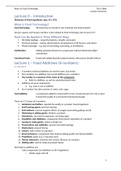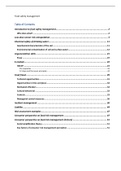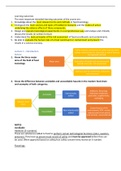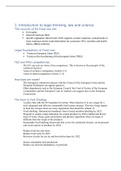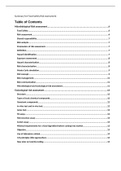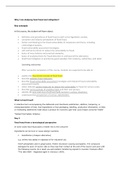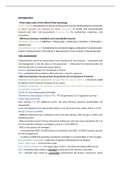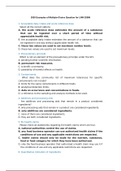Wageningen University (WUR) • Food Safety
Meest recente samenvattingen voor de opleiding Food Safety op de Wageningen University (WUR). Op zoek naar een samenvatting voor Food Safety? Wij hebben diverse samenvattingen voor de opleiding Food Safety op de Wageningen University (WUR).
-
25
- 0
- 0
Vakken Food Safety op de Wageningen University (WUR)
Er zijn samenvattingen beschikbaar voor de volgende vakken van Food Safety op Wageningen University (WUR)
- Food fraud and mitigation FQD-36306 1
- Food law LAW22806 1
- Food Quality Management FQD-20306 1
- Food related allergies and intolerances 1
- Food safety management FHM61312 2
- Food safety risk assessment FHM30306 1
- Food toxicology TOX30306 2
- FQD20306 Food Quality Management FQD-20306 2
- FQD20306 Food Quality Management (FQD-20306) FQD-20306 1
Populaire samengevatte boeken Wageningen University (WUR) • Food Safety
Nieuwste samenvattingen Wageningen University (WUR) • Food Safety
Summary of the Lectures and the Tutorials. Includes the Powerpoint slides and notes of the speech.
After completion of this course students are expected to be able to: - contribute as a specialist to the solution of complex problems; - make use of risk assessment in formulating risk management options; - propose risk management options taking into account scientific, societal, economic, legal, ethical and communication considerations; - underpin an advice with arguments and adjust the scientific message to the audience; - defend propositions in large meetings; - apply risk management t...
After completion of this course students are expected to be able to : - understand the most relevant terms and methods in food toxicology; - understand the main sources and types of foodborne toxicants and the mechanisms and modes of action underlying the adverse effects of these compounds; - understand the basic principles of the risk assessment of food ingredients and contaminants; - perform practical experiments in a comprehensive way; - analyse and critically discuss the results of prac...
After completion of this course students are expected to be able to: - understand how food products are regulated; and are able to identify and analyse the pertinent food law rules that are applicable; - understand the processes of food law making; - understand how to determine motives or causes, and make interpretations on the basis of an analysis of the concepts, relationships and organizational principles of the domain; - find and use the relevant legal databases and information sources ...
Learning outcomes: After completion of this course students are expected to be able to: - describe main preservation processes and the spoilage associated organisms for specific food products; - explain the factors that influence growth and inactivation of micro-organisms in food products qualitatively and quantitatively; - know main characteristics of microorganisms that cause foodborne diseases (including mycotoxin producing fungi), and their relation to food products, and apply this to fo...
After completion of this course students are expected to be able to: - have an overview of the occurrence and characteristics of food-borne pathogens; - debate the effect of processing on the occurrence of toxic compounds and the level of pathogens present; - distinguish host responses to pathogens and their toxins; - discuss the role of gut microbiota in toxicological risks of food-borne chemicals; - compare and apply dose response models; - build models to estimate microbiological and to...
After completion of this course students are expected to be able to: - explain the theoretical concept of food fraud; - describe and rate relevant fraud indicators; - describe fraud vulnerability assessment strategies and interpret fraud vulnerability assessment results; - to develop a control plan and select relevant control measures to reduce the vulnerability to fraud for various cases; - describe various groups of analytical tests and their user groups; - identify the pros and cons o...
summary of each lectures marked by teacher; useful during study week
Summary FHM-51302 Basics in Food Safety
the questions are released by the lecturer of food law. I put them together in this document.





